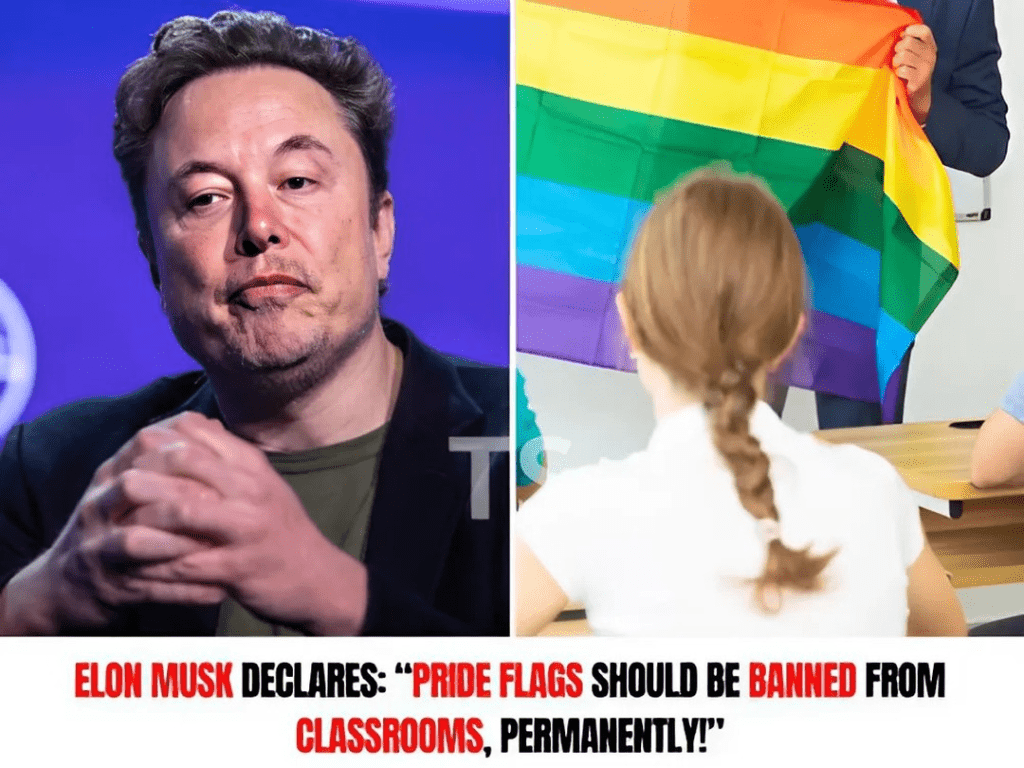In a statement that has sparked a heated debate across the country, Elon Musk, the billionaire CEO of Tesla and SpaceX, has called for the removal of pride flags from schools. Musk argued that schools should be dedicated to education and intellectual development, not serve as platforms for political statements or protests. His comments have ignited strong reactions, raising questions about the role of schools in balancing inclusivity and academic focus.

Musk’s Argument: Schools Should Prioritize Learning, Not Political Movements
Musk’s remarks came during a recent interview in which he shared his concerns about the increasing presence of political and social movements within educational spaces. While he expressed support for individual freedoms of expression, Musk emphasized that schools should remain neutral and focused on academics. He argued that displaying pride flags and other politically charged symbols could detract from the primary mission of schools — to foster intellectual growth and provide a well-rounded education.
In Musk’s view, the growing trend of political symbols in schools risks transforming educational institutions into arenas for protest, rather than maintaining their role as centers of learning. He believes that students should be able to focus on core academic subjects, such as math, science, and history, without the distractions of social and political movements.

The Reaction: Supporters and Critics Clash
Musk’s statement quickly sparked polarized reactions. Supporters of his stance agree that schools should be spaces for learning, not political activism. They believe that schools should be neutral environments where students can freely explore ideas without the influence of external ideologies. For these individuals, removing political symbols, including pride flags, would help maintain the focus on academics and prevent the classroom from becoming a platform for social movements.
On the other hand, many people disagree with Musk, arguing that inclusivity and representation should play a critical role in education. For these individuals, pride flags symbolize acceptance and support for LGBTQ+ students, sending a message that all students, regardless of their sexual orientation or gender identity, are welcome and valued in the educational space. Critics of Musk’s position contend that removing pride flags could marginalize LGBTQ+ students and send a harmful message of exclusion.
The Role of Schools in Promoting Inclusivity and Social Justice
Musk’s comments have raised larger questions about the role of schools in fostering inclusivity and promoting social justice. In recent years, many educational institutions have made efforts to create supportive environments for students from diverse backgrounds, including LGBTQ+ students. For supporters of these initiatives, the display of pride flags is an important symbol of acceptance and a signal that schools are safe spaces for everyone, regardless of their identity.
By including symbols of diversity, such as pride flags, schools can demonstrate their commitment to creating inclusive environments. Many educators argue that fostering a safe and supportive atmosphere for all students, including those who are marginalized, is essential to their overall well-being and academic success.
The Cultural Divide: Symbolism and Free Expression
The debate over pride flags in schools is also reflective of the larger culture wars playing out in communities across the country. Issues related to gender identity, sexual orientation, and free speech have become contentious, with some advocating for greater inclusion and representation, while others call for a return to traditional values. Musk’s remarks add fuel to this ongoing divide, as the conversation about the role of politics and symbolism in education continues to escalate.
At the heart of the debate is the question of whether schools should remain neutral in matters of identity and social issues. Musk’s view is that schools should be free from external political influences, while others argue that inclusivity should be prioritized to ensure that all students feel valued and supported.
LGBTQ+ Advocates Respond: The Importance of Visibility and Support
LGBTQ+ advocacy groups have strongly condemned Musk’s position, warning that removing pride flags from schools would be a step backward in the fight for equality and acceptance. These groups argue that pride flags provide important visibility for LGBTQ+ students, especially those who may be at greater risk of bullying, discrimination, and mental health struggles. Removing such symbols, they argue, could further isolate and marginalize vulnerable students.
For many, the presence of pride flags is not just a political statement but a sign of solidarity and care for students who often face significant challenges. The flags can serve as a source of comfort and affirmation, reminding LGBTQ+ students that they are seen, supported, and respected in their school environment.
The Broader Debate: Balancing Education and Social Values
Musk’s comments have also highlighted the broader question of how to balance freedom of expression with institutional neutrality. While schools are primarily meant to be places of academic learning, they are also social environments where students interact with each other and with the larger community. Some argue that schools can be both spaces for learning and places that promote social change, where diversity and inclusivity are celebrated alongside academic excellence.

As the debate continues, it is clear that there is no one-size-fits-all solution to the question of pride flags in schools. Schools must navigate the complex issue of balancing neutrality with the need to support students from all walks of life. The question remains whether removing pride flags is the best way to preserve academic focus, or whether it sends the wrong message to students in need of acceptance and validation.
The Future of Education and Inclusivity
Musk’s comments have certainly opened up an important dialogue about the role of schools in shaping social values. As the conversation continues, it is clear that the issue of pride flags in schools will remain a point of contention. How schools respond to these debates — and whether they will continue to support symbols of inclusivity — will have a lasting impact on the future of education and the role of schools in fostering a more accepting and diverse society.
As the debate unfolds, it remains to be seen whether Musk’s call for the removal of pride flags will gain traction, or if schools will continue to prioritize inclusivity and the celebration of diversity. Regardless of the outcome, the conversation surrounding this issue is far from over, and it will likely continue to shape discussions about the role of schools in both education and social change.


